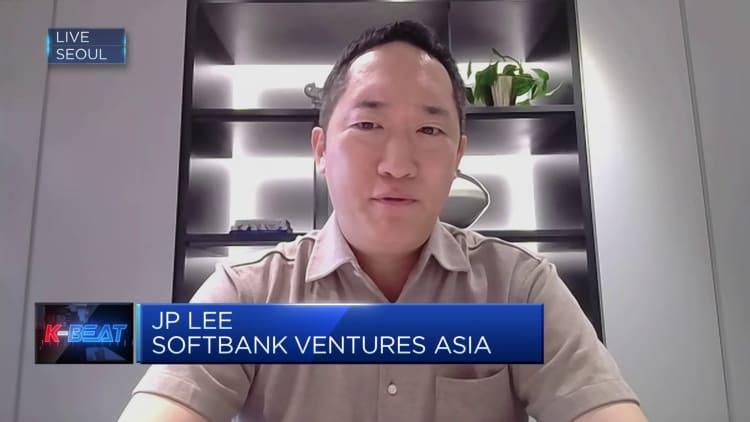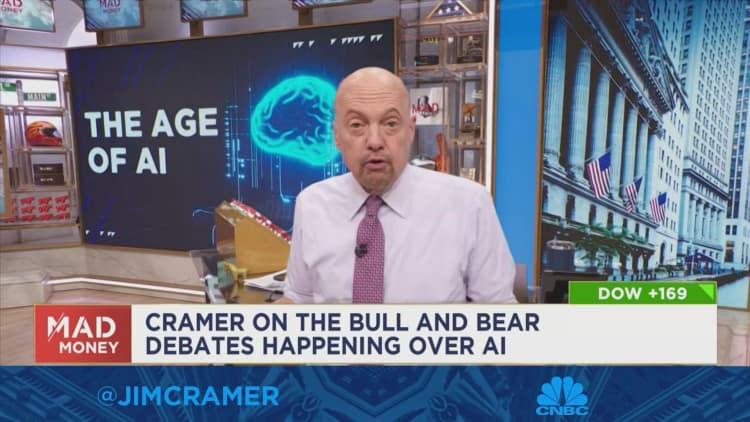AMSTERDAM, Netherlands — Major banks and fintech companies claim to be piling into generative artificial intelligence as the hype surrounding the buzzy technology shows no signs of fizzling out — but there are lingering fears about potential pitfalls and risks.
At the Money 20/20 fintech conference in Amsterdam, Netherlands, executives at large lenders and online finance firms sang the praises of generative AI, calling it an "explosion of innovation," and saying it will "unleash innovation in areas that we can't even think about."
Chalapathy Neti, head of AI at global bank messaging network Swift, described the progress made with ChatGPT and GPT-4 as "mind-boggling." He added, "This is truly a transformative moment."
But in the short term, banks are scrambling to figure out the use cases.
The Netherlands' ABN Amro is one banking giant that's piloting the use of generative AI in its processes.
Annerie Vreugdenhil, chief commercial officer of ABN Amro's personal and business banking division, revealed on a panel that it is using the technology to automatically summarize conversations between bank staff and customers. It's also using it to help its employees gather data on customers to assist with answering queries and avoid repetitive questions.
The bank is now in the process of scaling these pilots to 200 employees and is exploring a number of new pilots to start this summer.
In a closed-door session on the application of AI in financial services, meanwhile, two banking executives explained how they're using the technology to improve their internal code and analyze how their clients are behaving.
"We are experimenting at this stage and we don't have necessarily anything client facing but we are using the [tech the] same as other companies, for example, code refactoring, comms calls, the other way around," said Mariana Gomez de la Villa, an executive at ING Bank specializing in strategy and innovation.
Indeed, the banks appeared unanimous in their hesitation to roll out ChatGPT-like tools to customer-facing scenarios.

Jon Ander Beracoechea Alava, advanced analytics discipline head at Spanish bank BBVA, said that the lender had taken a "conservative approach" to AI, adding that, at this stage, generative AI is "still early" and "immature."
A crucial issue is that advanced AI systems require the processing of huge volumes of data — a sensitive commodity wrapped up in all kinds of rules and regulations. As such, Alava said that at this stage it was too "risky" to involve sensitive information from customers.
Generative A.I., explained
Generative AI is a specific form of AI that is able to produce content from scratch. The systems take inputs from the user and feed them into powerful algorithms fueled by large datasets to generate new text, images and video in a way that's more humanlike than most AI tools already on the market.
The technology was thrust into the spotlight following the success of OpenAI's GPT language processing technology. ChatGPT, which uses massive language models to create human-sounding responses to questions, has ignited an arms race among some companies over what is seen as the next "paradigm shift" in tech.
In March, Goldman Sachs' chief information officer, Marco Argenti, told CNBC the bank is experimenting with generative AI tools internally to help its developers automatically generate and test code.
More recently, in May, Goldman spun off the first startup from the bank's internal incubator — an AI-powered social media company for corporate use called Louisa. The push into AI is part of a larger effort by CEO David Solomon to expedite the bank's digital makeover.
Morgan Stanley, meanwhile, is using it to inform its financial advisors on queries they may have. The bank has been testing an OpenAI-powered chatbot with 300 advisors so far, with a view to ultimately aid its roughly 16,000 advisors in making use of Morgan Stanley's repository of research and data, according to Jeff McMillan, head of analytics and data at the firm's wealth management division.
A.I. 'co-pilot'
These are just some examples of how financial firms are using AI, but more as a digital helper than as a core part of their services.
Gudmundur Kristjansson, CEO and co-founder of Icelandic regulatory technology firm Lucinity, showed CNBC how artificial intelligence can be used to assist with a key area in finance: fighting crime.
An AI tool the company created, called Luci, aims to help compliance professionals with their investigations. In a live demonstration, Kristjansson showed himself looking into a money laundering case. The AI tool analyzed the case and described what it saw and then completed an independent review.
In this use case, the AI acts as more of a resource — or "copilot" — to help an employee find data and flesh out a case rather than replace the role of a person looking into reports of suspicious activity.
"Where you find money laundering is through ... interconnected networks of people who are basically employed to do it. That's why it's so hard to find it. Banks spent this year $274 billion on prevention," Kristjansson told CNBC in an interview.
He said where Luci helps is by vastly reducing the amount of time spent trying to work out whether something is fraud or money laundering.

The whole appeal of AI to the big banks and fintechs, Money 20/20 attendees said, is the potential reduction in the time and money it takes to complete tasks that can take human employees days.
Niklas Guske, chief operating officer at Taktile, a startup that helps fintechs automate decision-making, acknowledged that the use of AI is challenging in the financial sector, given the lack of publicly available data.
But he stressed that it could be a "crucial" tool to reduce the companies' operational expenses and improve efficiency.
"In many fintech applications, this is done through an increase in automation and reducing manual processes, especially in onboarding and underwriting," he told CNBC.
"This automation is truly enabled through access to more data sources, which empower lenders to gain new insights and identify the right customers without having to parse through dozens of PDFs for the right piece of information."
— CNBC's Hugh Son contributed reporting.



